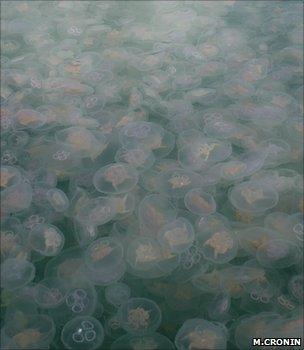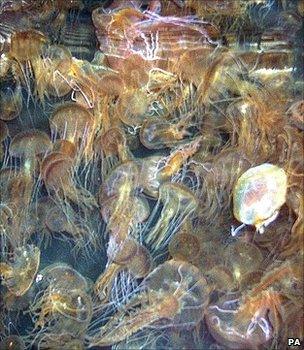Jellyfish 'may benefit from ecosystem instability'
- Published

The causes behind jellyfish blooms are difficult to disentangle, say the authors
A team of researchers have been trying to identify how jellyfish may benefit from marine ecosystems destabilised by climate change and overfishing.
There is concern that a rise in jellyfish numbers could prevent depleted commercially important fish stocks recovering to historical levels.
However, a study by European scientists says more data is needed to understand what is happening beneath the waves.
The findings are set to be published, external in the journal Global Change Biology.
Researchers from the UK and Ireland said samples collected from the Irish Sea since 1970 have recorded an increase in material from cnidarians (the division of the animal kingdom that includes jellyfish and coral), "with a period of frequent outbreaks between 1982 and 1991".
"There does appear to have been an increase in abundance since 1994 for the Irish Sea," said co-author Christopher Lynam, a researcher at the Centre for Environment Fisheries and Aquaculture Science (Cefas).
The team added that previous studies had recorded changes to marine ecosystems as a result of various factors, such as the removal of top predators, and changes to the distribution and characteristics of plankton.
'Jellyfish joyride'
These changes have led to a growing concern that the oceans may become increasingly dominated by jellyfish because "many gelatinous zooplankton species are able to increase in abundance rapidly and adapt to new conditions".

Vast blooms of certain jellyfish can cause havoc in affected areas
In recent years, there have been a number of examples of sudden blooms of jellyfish in European waters - including the Irish, Mediterranean and Black seas - which have killed fish and closed beaches.
In 2007, an invasion of mauve stingers (Pelagia noctiluca) wiped out Northern Ireland's only salmon farm, killing more than 100,000 fish.
However, Dr Lynam was keen to point out that the team's study was dominated by the common moon jellyfish (Aurelia aurita), which was not responsible for wiping out the salmon.
The main concern, the team wrote, was the establishment of a "never-ending jellyfish joyride" in which the creatures become so established that it makes it almost impossible for commercial fish stocks to return to historical levels.
But Dr Lynam told BBC News: "I don't think that the hypothesis that jellyfish will come into an area and dominate, not allowing anything to come back again, is really supported.
"Such a nightmare scenario does not seem to be the case, when you consider the data and studies that have been carried out."
Complicated picture
He explained that the team looked at whether factors such as changes to the climate and overfishing were responsible for the increase in jellyfish abundance.
"It is quite a complicated set of possible linkages that need to be drawn, which we really only have a vague insight at the moment.
"For the recent period where we have good data, it appears as if sea surface temperature is the most important variable.
"This does not necessarily prove it of course, but it does appear to be benefiting jellyfish."
The team, using data provided by the UK Met Office, commented: "The regional seas of the northeast Atlantic have been warming for the past 15 years at a rate not experienced in recent centuries."
Overfishing has also been linked to the rise of jellyfish populations. Research suggests that commercial fishing during the 20th Century had resulted in a change in the Irish Sea's ecosystem.
The researchers wrote: "The overexploitation of herring during the late 1970s was followed by a period of ecosystem instability in the 1980s in which the frequency of occurrence of cnidarian material... rose to high levels, indicating outbreaks of jellyfish."
Dr Lynam added: "If you take out a lot of the plankton feeders, there could be more food for jellyfish so they might become more abundant. There may be feedback mechanisms that we are not aware of, so there does need to be further study."
But he cited examples in the North Sea and Black Sea where fish species had declined, leading to an increase in jellyfish abundance, but the introduction of measures such as limits on catches had resulted in a recovery of fish stocks.
The team urged for the monitoring of jellyfish to continue, and concluded: "The move to ecosystem-based fisheries management requires extensive ecological knowledge and an understanding of the risks posed by any indirect effects... of our utilisation of the sea's resources."